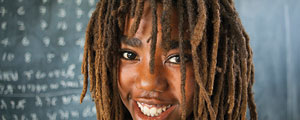
DEBATE on whether or not pupils with dreadlocks should be allowed in schools has resurrected with the ferocity of a tsunami, with the Harare Junior Mayor adding his voice.
Report by Winstone Antonio
Despite a landmark ruling by the Supreme Court in 2007 barring schools from expelling deadlocked pupils on grounds of their hairstyles, there has largely been no joy for teens sporting dreadlocks.
The Supreme Court passed the ruling after a Zimbabwe Lawyers for Human Rights (ZLHR) lawyer Zvikomborero Chadambuka petitioned the Constitutional Court representing Farai Benjamin Dzvova who had been barred from attending school because of dreadlocks.
Harare Junior Mayor Takunda Aaron Chimutashu has added his voice onto on debate.
“I believe teens sporting dreadlocks due to religious beliefs must be allowed to attend any school of their choices regarding that people must exercise their right to religion,” said Chimutashu. “However, in such a case, the dreadlocks must be well maintained for hygiene.
“But if the dreadlocks are spotted for fashion and style, short hair is the norm,” he added.
Meanwhile, parents interviewed by NewsDay Teens in a snap survey expressed mixed feelings, although most of them suggested that children with dreadlocks must not be stopped from going to school.
- Chamisa under fire over US$120K donation
- Mavhunga puts DeMbare into Chibuku quarterfinals
- Pension funds bet on Cabora Bassa oilfields
- Councils defy govt fire tender directive
Keep Reading
“I am not a lawyer, but I believe barring a child from school simply because he or she has dreadlocks isn’t proper.
“It is clear that barring pupils from attending school infringes on the child’s constitutional rights to freedom of religion and protection from discrimination.
“Such matters only require a general rule from the schools to make exemptions for sincerely held religious and cultural beliefs and practices among students,” said Abraham Matope, a Chitungwiza parent whose children learn at Mberi Primary School.
“As parents, we’re not saying schools can’t have a dress code, but there is need for flexibility and exceptions in the case of a genuine religious practice. However, if parents fail to explain that dreadlocks are part of the family’s religious customs, the pupil can be expelled from school.
“Rastafarians are religious people just like members of the Apostolic sects. I therefore feel dreadlocked pupils must be allowed to enrol at any school of their choice,” said Frank Dhumbuka of Greencroft.
However, some parents insisted that no one must be allowed in school with dreadlocks as they pose a serious health hazard to classmates, especially if the one sporting them is not from a “smart family”.
“Clean shaven heads are good for kids’ health. Children play around with all sorts of dirt while at school including soil, hence the need to keep manageable hair.
“If other kids can shave their heads, Rastas must shave theirs too and not cry foul. “If they can’t do likewise, then they must consider sending their kids to Rastafarian schools in Ethiopia or Jamaica,” said Albion Mataranyika of Mufakose.
A law student, James Kambetete, also waded into the contentious issue and vowed that when he completes his degree, he would ensure that dreadlocked pupils are not dismissed from schools.
“I don’t see anything wrong with enrolling dreadlocked pupils. They must be allowed to obey the commands of their religion as long as they do not violate other people’s rights,” he said.
A number of screaming headlines have been cast on stories related to the dreadlocks saga in schools.
The headlines included; Battle of the dreads rages on; School dreadlocks ban is tested in court and Pupil, school face off over dreadlocks.
Although there are reports suggesting there is no substantive law dealing with Rastafarianism in schools, school administrators have always clashed with scholars who believe in Rastafarianism. In 2006, Farai Benjamin Dzvova, who comes from a Rastafarian family, was once barred from Ruvheneko Government Primary School on account of his hairstyle, prompting his father to launch a constitutional appeal on his behalf.
Farai’s parents had been practicing Rastafarianism for almost a decade and initially attended Chaminuka Rastafarian House in St Mary’s, Chitungwiza, which is the headquarters of the National Rastafarian Council.
That saw the Supreme Court ruling that he must be admitted in school. Last year, Mbalenhle Dube, a Rastafarian child at Masiyephambili Junior School in Bulawayo, was barred from attending Grade Zero lessons because of his dreadlocks.
Mbalenhle was finally admitted in the school after High Court Judge Justice Martin Makonese granted an order allowing him to attend lessons.
In a similar case recently, authorities at Bulawayo Adventist Secondary School were reported to have barred a juvenile who became the third child in Zimbabwe to be barred from attending classes for sporting dreadlocks.
Reports were that Anele Makhiwa, a former Hillside Primary School pupil, who has been wearing dreadlocks since she was three years old, was also booted out of school during the first week when schools opened for wearing dreadlocks despite having passed the entrance test earlier.
However, in the world of sport, top Zimbabwe cricketers Tawanda Mupariwa, Keith Dabengwa and Stuart Matsikenyeri were ordered by the then Zimbabwe Cricket Union to cut their flowing dreadlocks “so as to look uniform with others and improve the country’s image”.











